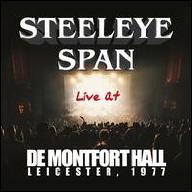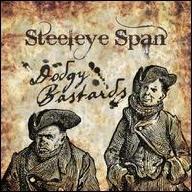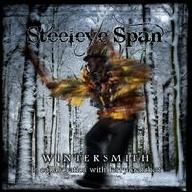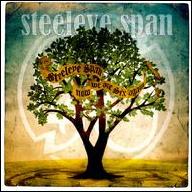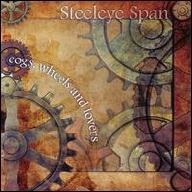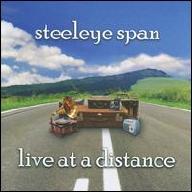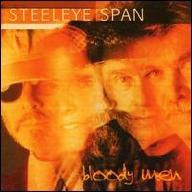In late 1969, bassist Ashley Hutchings departed the still-booming Fairport Convention, who had just created one of folk-rock's landmark releases in Liege Lief. Seeking another project keen on reinterpreting traditional fare, he teamed up with folk-singing duo Tim Hart and Maddy Prior, who had enjoyed some success in London around that time. Completing this initial squad was Irish musician Terry Woods, formerly of Sweeney's Men and later of the Pogues, and his wife, singer Gay Woods. Steeleye Span's 1970 debut, Hark! The Village Wait, marked a brief but interesting phase in their evolution with a pair of session drummers augmenting their sound and four distinctive vocalists vying for space. Although this lineup disbanded shortly after the album's release, its full-bodied acoustic-electric sound, mixed with intricately arranged a cappella group singing, introduced some of the hallmarks of the band's early sound. Without ever having performed live together, Terry & Gay Woods left the group in the mid-'70s to be replaced by another impressive folk scene veteran, guitarist Martin Carthy, and fiddler Peter Knight. Their involvement on 1971's Please to See the King represented a tonal shift toward a dense, drum-less sound that included a number of instrumentals and featured Prior and Hart as the primary vocalists. This trend continued on Ten Man Mop, Or Mr. Reservoir Butler Rides Again, which appeared in December of that year. In early 1972, Steeleye Span endured yet another major lineup shift with both Hutchings and Carthy bowing out. Having just signed a multi-album contract with the Chrysalis label, the remaining trio recruited bassist Rick Kemp and guitarist Bob Johnson, forming what many fans consider the "classic" Steeleye Span lineup that represented their most successful period. Still drum-less, the band's fourth album, Below the Salt, paired colorful renaissance themes with a uniquely rhythmic, rock-driven feel and delivered an unlikely Christmas hit single in their glowing arrangement of the ancient a cappella choral piece "Gaudete." Ascending both creatively and commercially, their next outing, Parcel of Rogues, was an equally strong effort in a similar vein that broke into the U.K. Top 30.
With mainstream success in their sights, Steeleye Span finally went full folk-rock and added drummer Nigel Pegrum to their lineup for 1974's Now We Are Six. Produced by Jethro Tull frontman Ian Anderson and featuring a saxophone cameo by David Bowie, the album tipped the band far more heavily into the rock and pop arena, even though the bulk of their source material was traditional. Early the next year, Commoner's Crown did much the same (and featured a cameo from actor Peter Sellers), though it was 1975's All Around My Hat that brought Steeleye Span to their commercial peak. Produced by Wombles creator Mike Batt, and led by its harmony-rich title cut, the album reached a career-high number seven on the U.K. albums chart with its lead single peaking at number five. As British punk entered the public consciousness, widespread interest in folk-rock began to fade and, in spite of its sonic similarities to All Around My Hat, the band's 1976 follow-up, Rocket Cottage, was a commercial failure.
During the latter part of the '70s, years of near-constant touring and recording began to take their toll and the band was again in flux with members departing and exploring side projects. Maddy Prior, now wed to bassist Rick Kemp, teamed up with June Tabor to record an album as Silly Sisters, while Johnson and Knight left the group to record the concept album The King of Elfland's Daughter. Replacing them for 1977's Storm Force Ten were Martin Carthy, making his second appearance as a member of Steeleye Span, and accordionist John Kirkpatrick, who filled Knight's instrumental role. This short-lived lineup was also captured on the 1978 live album Live at Last, after which Prior began a solo career and the group ostensibly broke up. Contractually bound to Chrysalis for one more LP, the band's classic mid-'70s lineup (including Johnson and Knight) re-formed one last time in 1980 to record Sails of Silver, a set of mostly originals, after which they went on hiatus, with Hart retiring from the music business altogether.
Although Steeleye Span remained a part-time touring affair, much of the '80s was given over to members' personal endeavors and side projects with no more albums until 1986's Back in Line. A transitional set, it was their first without founder Tim Hart, and would prove to be Kemp's last for quite some time. Featuring new bassist Tim Harries, 1989's Tempted Tried was a more robust and focused collection of mostly traditional songs that recalled the band's mid-'70s heyday. Replacing Pegrum on drums just after the album's completion was Irishman Liam Genockey, who would become the rhythmic backbone of the group's later years. Remarkably, nearly all of Steeleye Span's members, past and present, managed to come together for a 25th reunion concert in London in 1995 which was later released as The Journey. With Prior experiencing vocal issues, founding member Gay Woods returned to full-time to help out, and this lineup recorded 1996's Time; it was the first time since the band's debut that the two frontwomen had joined forces. Within a year, Prior left Steeleye Span to renew focus on her solo career. With her and Genockey both out, a lineup of Woods, Johnson, Knight, and Harries recorded 1998's more folk-driven Horkstow Grange with Fairport Convention drummer Dave Mattacks helping out on a few tracks. This same lineup swerved in a different direction for the surprisingly heavy, rock-oriented Bedlam Born in 2000.
Instigated by a fan poll on Knight's website, 2003's Present: The Very Best of Steeleye Span saw a reunited Prior, Knight, Kemp, Johnson, and Genockey re-recording two discs' worth of their earlier material, though Johnson's declining health wouldn't allow him to participate in the upcoming tour. Taking his place was Albion Band alum Ken Nicol, whose arrival helped reinvigorate the band over the next several years. Amid a flurry of releases, including 2004's highly regarded They Called Her Babylon and 2006's Bloody Men, the band played a memorable headlining set at Fairport's Cropredy Festival, and closed out their resurgent decade with 2009's all-traditional Cogs, Wheels and Lovers. With the year's end also came the news that long-retired founding member Tim Hart had passed away after his battle with cancer.
Nicol's departure in 2010 opened the door for two new members, guitarist Julian Littman and multi-instrumentalist Pete Zorn, and with their first six-piece lineup in many years, Steeleye Span revisited their 1974 standout Now We Are Six, which they played in its entirely on the double-live LP Now We Are Six Again. In 2013, 36 years after their last chart placement, the group made an improbable return to the U.K. albums chart with Wintersmith, a unique collaboration with beloved British fantasy author Terry Pratchett. With revived public interest in the band, they returned in 2016 with Dodgy Bastards, a set that featured newcomer Jessie May Smart, who replaced longtime member Peter Knight on fiddle. In 2019, celebrating a remarkable half-century run, Steeleye Span released their 24th studio album, Est'd 1969, and set out on a thorough 50th anniversary tour across the U.K. A four-disc concert album/DVD set was released later that year commemorating the tour.
In 2022, a massive box set spanning the group's 1972-1983 tenure on Chrysalis Records was released. Titled Good Times of Old England, the set included each of Steeleye Span's studio albums from this period along with plenty of archival material, the most notable of which was the previously unreleased Live at the Rainbow Theatre 1974. A highly bootlegged fan favorite, the concert album was also given its own separate release in late 2022. ~ Timothy Monger, Rovi


